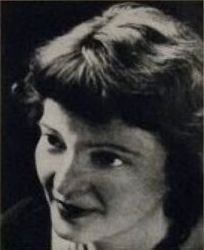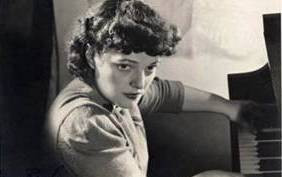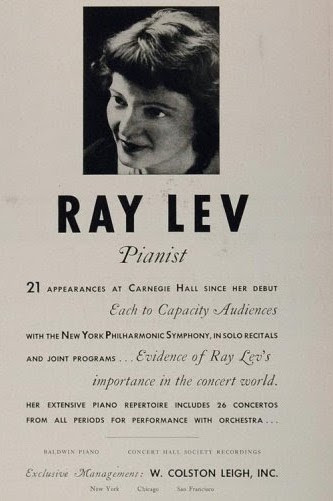Ray Lev
Настоящее имя: Ray Lev
Об исполнителе:
Ray Lev (8 May 1912, Rostov-on-Don, Russia — 20 May 1968, New York) was an American pianist and music educator. She had a prolific stage career since the 1930s, with a series of gramophone and LP records on Concert Hall Society, which notably declined after Lev publicly declared her communist views; she became one of the very few classical musicians blacklisted in the United States during the "Red scare" era after the Second World War. Ray committed suicide at fifty-six. Lev's family relocated to the United States a year after her birth; Ray began singing in her father's choir, who worked as a synagogue cantor, before deciding to pursue piano after hearing Ignacy Jan Paderewski play. She took lessons with Gaston Dethier in New York and won a New York Philharmonic Society scholarship. In 1929, Ray made her stage debut in England, performing Tchaikovsky's Piano Concerto No. 1 under Landon Ronald. Between 1930 and 1933, she further studied piano under Tobias Matthay. After returning to the USA, Ray Lev debuted at New York's Carnegie Hall in 1933 with the National Orchestral Association, conducted by Leon Barzin. In March 1934, Ray gave her first solo recital at Town Hall, New York. A prolific stage career followed, with tours across Europe, Canada, and the USA, radio broadcasts, and annual sold-out recitals at Carnegie Hall. She performed with several notable ensembles, including Budapest String Quartet and Paganini Quartet. During the Second World War, Ray regularly played for the US Army and allied forces, earning seven commendations for patriotic service. In May 1948, Ray Lev joined a group of 30 American writers and artists, including novelist Howard Fast, Hollywood screenwriter Alvah Bessie, anthologist Ben Botkin, and several other editors and contributors of "Masses & Mainstream" journal, who signed an open letter of solidarity with Soviet communists. The American public and media met this bold statement with tremendous backlash, leading to high-profile cancellations of the "Hollywood Ten" and other intellectuals who openly supported communism. Ray's career was no exception and suffered drastically; she later fell disillusioned in the communist ideals, especially after Nikita Khrushchev's campaign to debunk "the cult of Stalin" began in 1956. She reportedly had a nervous breakdown upon reading the Soviet news, regretting her prior allegiance, and never made any other public political statements. (For instance, she even refused to sign a petition against the Vietnam War in 1967). In 1964, Ray Lev joined the Tokyo University of Fine Arts faculty; later, she gave private lessons. Some of Lev's notable students include Anne Gamble Kennedy, Aki Takahashi, and Bob Telson. Lev returned to New York in 1967 and gave at least two more concerts at Carnegie Hall. In April 1968, Ray performed Schumann's Piano Concerto, a month before ending her life at Spencer Arms Hotel in Manhattan.
Альтернативные названия:
Вариации названий:
César Franck
LP


